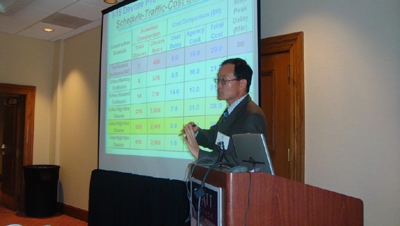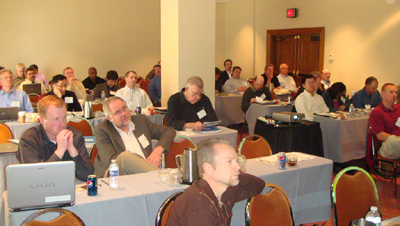U.S. Department of Transportation
Federal Highway Administration
1200 New Jersey Avenue, SE
Washington, DC 20590
202-366-4000
Focus
| Accelerating Infrastructure Innovations |
Publication Number: FHWA-HRT-09-014
Date: June 2009
At the Federal Highway Administration's (FHWA) Life Cycle Cost Analysis (LCCA) Technical Forum, held April 21, 2009, in St. Louis, Missouri, more than 60 attendees learned more about the fundamentals of LCCA, discussed their own experiences in applying LCCA principles using the FHWA RealCost software, and were introduced to the latest version of the software. Also participating through a Web link were an additional 25 online attendees. "The forum was a great opportunity for State presenters to display examples of the LCCA they performed when using the FHWA RealCost software. It also provided attendees an opportunity to discuss any issues or questions they might have regarding using LCCA or the RealCost software," says Tashia Clemons of FHWA's Office of Asset Management.
FHWA's LCCA Team, which includes representatives from the Agency's headquarters office, Resource Center, and the Turner-Fairbank Highway Research Center, made presentations on both LCCA and the RealCost software at the forum. LCCA is an analytical tool that provides a cost comparison between two or more competing design alternatives that produce equivalent benefits for the project being analyzed, evaluating agency and user costs over the life of the various alternatives. Because LCCA focuses on costs required over the life of an asset to maintain it above some minimum performance level, the lowest cost alternative is not necessarily the one with the lowest cost of initial construction.
 |
 |
| E.B. Lee of the University of California at Berkeley makes a presentation at FHWA's Life Cycle Cost Analysis Technical Forum, held April 21, 2009, in St. Louis, MO. |
In a survey of LCCA use conducted by Clemson University in 2005 for the South Carolina Department of Transportation, 33 State transportation departments and 2 Canadian Provinces responded. Of the respondents, 94 percent were using LCCA for pavements. Respondents noted that they typically include the following costs when calculating agency LCCA costs:
Fourteen States reported including user costs in their LCCA analysis, with 10 of them incorporating work zone user delay costs. Fifty-six percent, meanwhile, incorporated the value of recovered or recycled materials. Eighty percent were using the deterministic approach to conduct LCCA, which uses inputs with fixed values to calculate life cycle cost. The remaining 20 percent were using the probabilistic approach, which assigns a range of possible inputs to each uncertain variable to calculate a probability distribution of results. This approach allows risk to be quantified for the input variables.
At the forum, Bill Farnbach of the California Department of Transportation (Caltrans) highlighted his State's experiences with LCCA. California updated the Caltrans Highway Design Manual in June 2006 to incorporate the use of LCCA to determine the optimum pavement design for new construction, widening, and rehabilitation projects. Caltrans' Division of Design also developed a Life-Cycle Cost Analysis Procedures Manual for pavements, which is available online at www.dot.ca.gov/hq/esc/Translab/ope/LCCA.html. The Procedures Manual walks staff through using FHWA's RealCost program, including providing data, calculations, or sources for data needed to run RealCost and information on how to analyze the RealCost results. "The goal is that any two engineers from anywhere in the State can get the same right answer on the same project in less than 1 day's time," noted Farnbach.
The Colorado Department of Transportation (CDOT) also discussed its experiences in using LCCA. CDOT has been performing LCCA since the early 1970s. Its LCCA process currently specifies that both a deterministic and probabilistic analysis be performed. "However, we have recognized the benefit in using a probabilistic analysis and the fact that it allows us to model uncertainties in our cost assumptions," said Craig Wieden of CDOT. Beginning in July 2009, CDOT will switch to using a probabilistic analysis only. This analysis is performed using FHWA's RealCost program. CDOT also uses a program known as WorkZone to calculate user costs. "This program allows for various construction work alternatives to be analyzed, and also lets us look at traffic queue lengths and delays," noted Wieden. "Alternatives that create traffic queues over 5 miles in length or delays of over 30 minutes are not allowed."
RealCost is now available in Version 2.5, which incorporates many upgrade requests submitted by various transportation agencies. The software provides a tool to perform LCCA for pavement selection in accordance with FHWA best practice methods. RealCost can also be used to perform a cost comparison for bridges and structures. The LCCA best practices are outlined in FHWA's Life-Cycle Cost Analysis Primer (Pub. No. FHWA-IF-02-047), while the software methodology is documented in FHWA's Life-Cycle Cost Analysis in Pavement Design (Pub. No. FHWA-SA-98-079). Among the enhancements found in Version 2.5, the number of design alternatives that can be simultaneously analyzed has increased from two to six. Users can select up to 24 activities to be included in each design alternative, compared to the previous version of the software, where only a fixed number of seven activities could be selected. Up to four different traffic distributions, such as for a weekday or weekend, can also be defined and selected. Different traffic distributions can be selected for different activities within the same design alternative. The remaining life value calculation has been modified as well to consider both the structural and service life remaining at the end of the analysis period. RealCost has also been enhanced to reduce the file size and improve execution time. To download RealCost 2.5, visit www.fhwa.dot.gov/infrastructure/asstmgmt/lccasoft.cfm. FHWA's LCCA publications are available at www.fhwa.dot.gov/infrastructure/asstmgmt/lcca.cfm.
For more information on the LCCA Technical Forum or using LCCA, contact Tashia Clemons in FHWA's Office of Asset Management, 202-366-1569 (email: tashia.clemons@fhwa.dot.gov). LCCA resources, including examples of RealCost LCCA input files and reports displayed by State presenters at the forum, are available online at www.fhwa.dot.gov/infrastructure/asstmgmt/lcca.cfm.